Iran Claims Nuclear Talks With IAEA Going Smoothly

Iran's nuclear chief Mohammad Eslami says Tehran and UN atomic watchdog, the IAEA, are in constant contact and talks between the two sides are progressing.

Iran's nuclear chief Mohammad Eslami says Tehran and UN atomic watchdog, the IAEA, are in constant contact and talks between the two sides are progressing.
Eslami said Tuesday that the talks with the International Atomic Energy Agency are pursued and experts report daily on the progress.
Meanwhile, in a communique, G7 foreign ministers meeting in Japan reiterated Tuesday that Iran should never develop nuclear weapons.
“We call on Iran to fulfil its legal obligations and political commitments regarding nuclear non-proliferation without further delay,” G7’s final communique said.
Additionally, the G7 ministers expressed concern over Iranian destabilizing activities in the region and weapons transfers to Russia.
During a trip to Tehran in early March, IAEA's director Rafael Grossi said he reached an agreement to ensure Iran's full cooperation and said more meetings would take place soon.
His visit came amid discussions with Iran about uranium particles enriched to up to 83.7% purity, very close to weapons grade, at its Fordow enrichment plant.
Iran claims its nuclear program is for peaceful purposes only. However, the US and its allies suspect that the Islamic Republic is seeking to develop nuclear weapons. The US imposed strict economic sanctions on the country in an effort to force it to change course.
Iran signed an agreement with six major world powers in 2015 in exchange for relief from US, European Union, and UN sanctions on its nuclear program.
However, former US President Donald Trump reneged on the deal in 2018, restoring harsh US sanctions, which resulted in Iran violating the deal's nuclear limits.
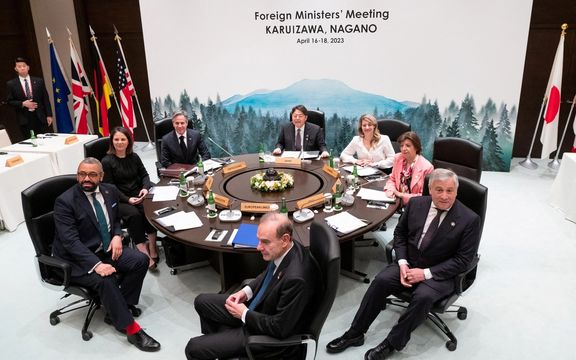
G7 foreign ministers meeting in Japan reiterated Tuesday that Iran “must never develop nuclear weapons,” and urged Tehran in a communique to cease nuclear escalation.
“We call on Iran to fulfil its legal obligations and political commitments regarding nuclear non-proliferation without further delay,” G7’s final communique said.
The G7 minister also expressed concern over Iran’s “destabilizing activities” in the region and transfer of weapons to Russia.
The United States, United Kingdom, France and Germany are the original signatories of the 2015 JCPOA nuclear agreement with Iran that restricted its nuclear program in exchange for suspension of international sanctions.
However, after US withdrawal from the deal in 2018 and imposition of sanctions, Tehran announced it will not be bound by JCPOA limitations and began enriching uranium at higher levels than set in the agreement.
Russia and China, Iran’s traditional allies, were also JCPOA signatories, but they put the onus of the deadlock on the United States, urging Washington to end its sanctions against Iran.
Subsequent negotiations in 2021 and 2022 to revive the JCPOA reached a deadlock last September, as Iran contuse to enrich uranium at the dangerously high 60-percent purity. Western government and experts say that it would be relatively easy and fast for Iran to enrich at 90 percent needed for producing a nuclear bomb. Iran has amassed enough enriched uranium at 60-percent that it can now further refine the stockpile and build two bombs.
“We remain deeply concerned about Iran’s unabated escalation of its nuclear program, which has no credible civilian justification and brings it dangerously close to actual weapon-related activities,” the G7 top diplomats said.
However, the G7 said that diplomacy remains their preferred path toward an agreement with Iran.
After talks broke down last year, Washington said that Tehran had balked at accepting a European Union compromise draft agreement and had presented “extraneous demands.”
Iran also has a major disagreement with UN’s International Atomic Energy Agency (IAEA) over its secret nuclear activities more than two decades ago and has failed to provide satisfactory answers to the international watchdog.
The west had a chance to censure the Islamic Republic in IAEA’s board meeting in early March, but days before the meeting the Agency’s head Rafael Grossi decided to travel to Tehran and seek an agreement.
The result was that the two sides announced a deal for quick cooperation and Grossi returned with a “peace in our times” paper claiming his trip was not a failure.
Since then there has been no news of a follow-up or meetings between IAEA experts and Iranian officials to pursue a resolution to technical matters.
The G7 communique referred to this issue, once again asking Tehran to cooperate, while in March it decided not to censure Iran.
“We take note of Iran’s stated readiness to provide the IAEA with further information and access to address the outstanding safeguards issues, and its agreement to allow the IAEA to implement further appropriate verification and monitoring activities,” G7 ministers stated.
One reason the United States has put nuclear talks on ice is Iran’s supply of weapons to Russia.
“Iran must stop supporting the Russian military in its war of aggression. In particular, we call upon Iran to cease transferring armed UAVs, which have been used in Ukraine,” G7 demanded, and also brought up Tehran’s human rights violations.
“We reiterate our profound concern over Iran’s systemic human rights violations and abuses, especially with Iran’s efforts to oppress peaceful dissent through threats and intimidation.”
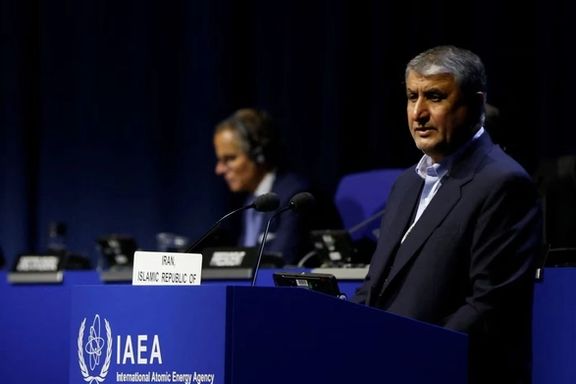
The past year was a year full of tensions and Iran faced complex behaviors by Western powers, nuclear chief Mohammad Eslami said at the Friday Prayers in Tehran.
Eslami who is the head of the Atomic Energy Organization of Iran (AEOI) addressed the Friday congregation at its traditional venue in Tehran University, trying to portray the country’s nuclear program as a beacon of its scientific achievements and useful for civilian purposes.
Eslami also reiterated a common propaganda point by the Islamic Republic that Western powers do not want Iran and similar countries to gain access to technology, an argument debunked by economic progress China, South Korea, and others have made.
“New technologies are the arena of domination,” Eslami claimed, adding that Iran is being “punished for its progress.”
Anti-regime Iranians know this well and hold the Islamic Republic responsible for their economic pain and the country’s international isolation, as well as lack of freedoms and repression.
Iran’s secret nuclear program was revealed in 2002, followed by international and particularly Western pressure to come clean and accept monitoring by the International Atomic Energy Agency (IAEA), as well as limit the degree of its uranium enrichment to civilian uses.
After years of diplomacy, world powers, including Russia and China, agreed to impose sanctions on Tehran to force it to come to an agreement. In 2015, the Joint Comprehensive Plan of Action (JCPOA) was signed between Iran, the United States, United Kingdom, France, Germany, Russia and China, suspending the sanction in exchange for limiting the nuclear program.
However, in 2018, former US President Donald Trump withdrew from the agreement, criticizing it as a weak deal that would allow Iran to pursue nuclear weapons once the agreement’s sunset clauses kicked in.
Eslami said that despite Western declarations of a desire to return to the JCPOA, “they were not committed to their own rationale and words,” putting Iran in a tough position. “They exceeded in putting pressures,” he added.
The US withdrawal was followed by new American sanctions on Iran’s economy, which began to seriously affect its finances. Tehran announced that it would no longer abide by JCPOA limitations and would increase both the quantity and level of its enrichment. However, once President Joe Biden won the 2020 election and vowed to return to the JCPOA, Tehran announced its decision to increase the enrichment level to 20 and then 60 percent, getting closer to weapons-grade uranium.
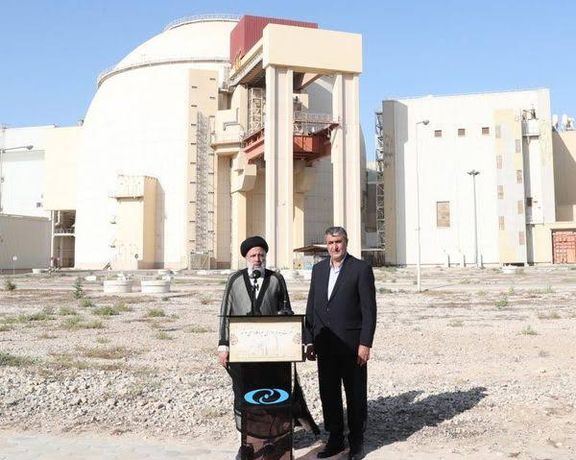
Negotiation followed in Vienna from April 2021, but by September 2022 the talks had reached a deadlock. Iran is now accumulating 60-percent uranium, while the US is maintaining the sanctions and saying that Tehran was deceptive during the talks and a return to the JCPOA is no longer on its agenda.
While Eslami in his speech tried to claim that the nuclear program has a useful civilian role, 60-percent enrichment can only have a military purpose – reaching the 90-percent weapons grade level.
The economic cost of the nuclear program has been very high for Iran, keeping economic growth near zero for more than a decade, leading to widespread poverty, antigovernment protests and one of the worst government repressions of the 21st century.
Opponents argue that the government did not need to make the country a hostage to its nuclear program, which has had virtually no economic benefit and only made the people of Iran suffer the price of punishing sanctions.
If the country had been transparent and abided by non-proliferation rules, it could have bought enriched uranium for civilian purposes from other countries. It’s intransigence has led to nothing but global isolation and the suffering of the Iranian people.
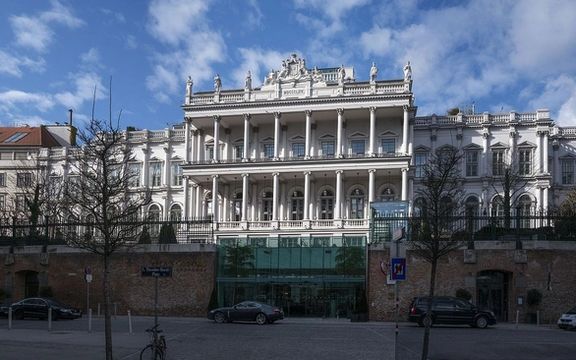
In a move might have been encouraged by the Iranian government, several commentators and former diplomats have called for the resumption of nuclear talks.
The pundits, who felt they could express their views in the local media, also supported an interim agreement with the United States which they said could be a positive achievement for Iran.
Former diplomat Ali Majedi advised the government in a commentary in Etemad daily, "not to be afraid of negotiations as Iran's foreign policy needs a serious development." He added that an interim agreement could be a prelude to returning to the 2015 Joint Comprehensive Plan of Action (JCPOA).
The idea of an interim agreement is a suggestion made by the United States which says it is currently not planning to return to the JCPOA, wrote Etemad.
Majedi said that a change in foreign policy has started with an agreement with Saudi Arabia to resume diplomatic ties after seven years of tensions. Majedi added that Supreme Leader Ali Khamenei's remark about Iran not holding a grudge against Europe in his Iranian New Year address could be a green light to Iranian diplomats to start settle the differences over the JCPOA.
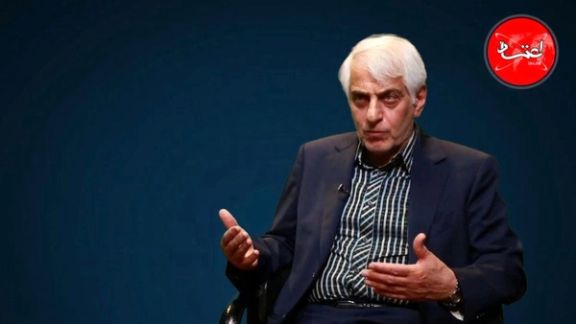
However, Khamenei later said in an early April speech that Iran should look for partners other than the United States and Europe.
Majedi, however, was not sure about the nature of an interim agreement and "what it means? Whether it is for six months or longer? Whether it can be extended?" Iran has previously dismissed an interim agreement emphasizing that it accepts nothing other than the 2015 agreement.
Majedi reiterated that if Iran can return to the agreement with the West and have the sanctions lifted, it would help its ailing economy. He added that "For its own interests, Iran's leaders should trust their negotiators no matter if the talks can or cannot be fruitful."
Meanwhile, another former diplomat , Abdolreza Faraji Rad suggested that "Iran and the United States had better start confidential negotiations," adding that "they might be able to reach an agreement if they talk face-to-face." The latest rounds of negotiations between Iran and the United States were indirect talks with European mediation, but the talks were suspended after Russia invaded Ukraine and Khamenei explicitly supported Russia and later Iran sent drones to be used against Ukraine.
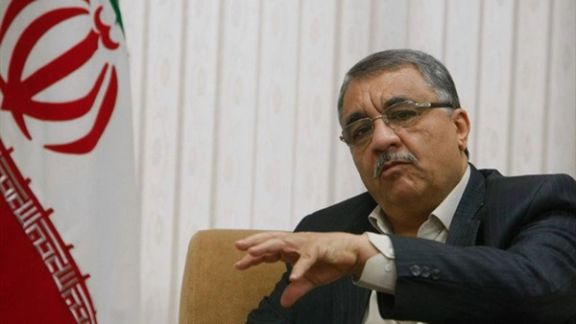
Faraji Rad added that the idea of an interim agreement and a new round of talks with the United States was put forward months before US media broke the news.
Taking the lead in the opposition to an interim government was IRGC-linked newspaper Javan which has always opposed any negotiations with America.
He said the United States and Europe are still not interested in renewed talks with Iran, but they have been mulling the idea of new negotiations in a bid to dissuade Iran from supporting Russia in the war against Ukraine. They believe winning Iran's heart with a Plan B including lifting some of the sanctions and allowing more oil exports could entice Iran to stop uranium enrichment at 60-percent level.
In another development, media commentator Hassan Beheshtipour said, "an interim agreement can be a temporary solution as a long-term agreement is impossible without holding negotiations with the United States."
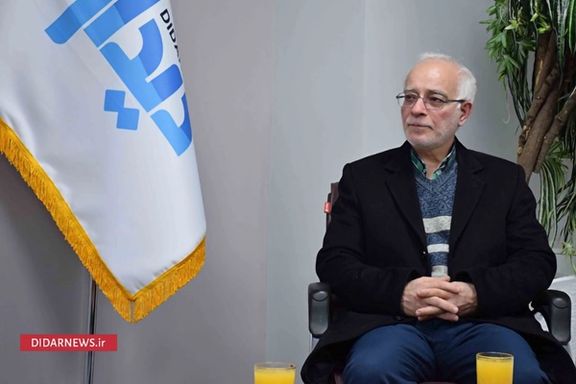
Beheshtipour, however, maintained that "an interim agreement cannot solve Iran's economic problem." He added that the most Iran can win in such an interim government is releasing its $7 billion frozen assets in South Korea.
He said, "Iran should nonetheless welcome the agreement if it helps solve its economic crisis. Otherwise, if Iran thinks it won’t face a major economic issue in the next four or five years, it can always wait for a more comprehensive agreement and a better solution."
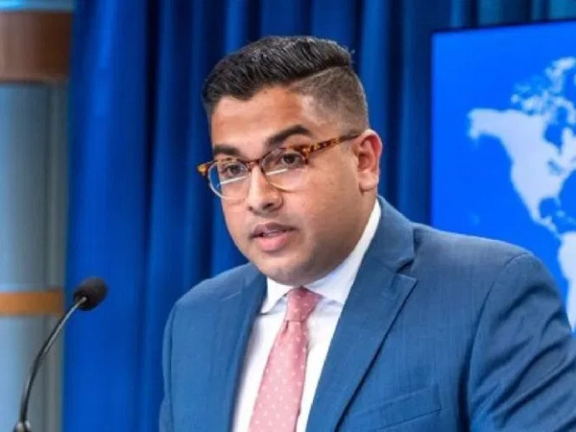
US State Department says reports about the administration planning a partial, interim nuclear deal with Iran are “rumors” that “tend to seldom be accurate.”
In response to a question on the issue by Iran International, State Department Deputy Spokesperson Vedant Patel also insisted that the President Joe Biden “has long said that he's committed to ensuring Iran never get to nuclear weapon, and we still believe diplomacy is the best way to achieve that goal. At the same time, we're preparing for all possible options and contingencies in coordination with our allies and partners.”
Axios reported on April 3 that according to multiple sources the administration shared a plan with allied governments to strike a partial deal with the Islamic Republic to freeze its uranium enrichment at 60 percent in exchange for some sanctions relief.
If true, Iran would gain the advantage of being a few months away from producing 90-percent enriched uranium needed for a nuclear weapon and enjoy the benefits of sanctions relief.
The Axios report also said that Israeli officials told the Biden team that Iran would be threading on dangerous ground that could lead to an Israeli military strike if it enriches above the 60-percent level.
However, spokesperson Patel said, “Rumors about nuclear diplomacy tend to seldom be accurate.” This is basically the same response given to Axios before it published its report, which does not categorically deny the report but tries to categorize it as a rumor that could be inaccurate.
Nearly 18 months of indirect talks with Iran to revive the 2015 nuclear accord, the JCPOA, reached a deadlock in September, and the administration since then has insisted that continuing the talks is not on its agenda.

As reports emerge that Washington is contemplating an interim agreement allowing Iran to enrich uranium to 60%, the Biden Administration is mostly silent.
Reports in Axios claim that a new proposal is being tabled which would offer Iran sanctions relief in exchange for a freeze on certain parts of the nuclear program.
The administration told Axios that it does not want to comment on "rumors" but reports of a plan for an interim deal have quoted several diplomats.
Iran has amassed 87.5 kilograms of 60% enriched uranium, according to an International Atomic Energy Agency report from late February. Experts say that if that uranium is enriched to 90% weapons grade, it would be a sufficient quantity to produce at least one nuclear bomb.
If the Biden team tries to gently return to the 2015 nuclear agreement, taken off the agenda last year over Iran's military assistance to Russia and Tehran's crackdown on anti-government protests, there are other risks ahead.
If sanctions are reduced in exchange for freezing Iran's enrichment at 60 percent, it will essentially recognize Tehran's right to hold on to fissile material that has no civilian use and can be only employed to make nuclear weapons. Under such a deal, Iran can change its mind in the future and quickly ditch the deal and dash towards a bomb in a few months, while having profited from sanctions relief.

The White House has failed to clearly deny the latest news, which suggests to many in Washington, that it is more a reality than a rumor.
An agreement on returning to the 2015 nuclear agreement was nearly reached last September, but Iran pulled out at the last minute after Western countries rejected its demand to shut down the International Atomic Energy Agency (IAEA) investigation into undeclared nuclear sites.
There is huge concern in the global community. Gabriel Noronha, the ex-State Department Iran advisor, said on Twitter: “This October, Iran can buy and sell ballistic missiles and long-range drones to any country (like Russia) *legally* under international law. The UN's asset freeze against 67 Iranian nuclear scientists and entities expires then too.
“In October 2025, all UN sanctions on Iran expire. The European Union pledged to end all its sanctions on Iran then as well. And what's worse, at that point, it will be next to impossible to ever put new ones back in place.”
The Iran threat remains high in Israel, Tehran's archenemy, which has told the US that with or without it, it will deal with the threat it poses. This week, Prime Minister Benjamin Netanyahu told its intelligence agency, Mossad, that Iran remains the threat of the generation.
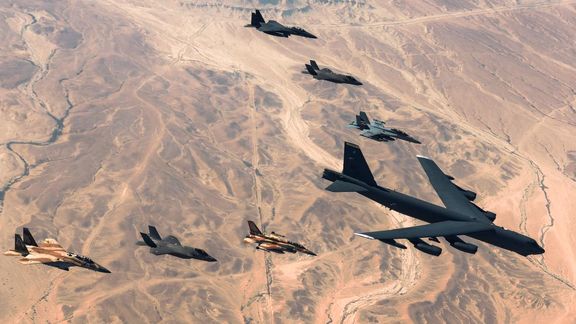
Israeli officials recently told the Biden administration and European officials that Iran risked a military strike if it enriches uranium above the 60% level, according to Axios.
At a gathering of intelligence staff this week, Netanyahu said: "In every generation there are those who rise up to destroy us and in this generation Iran has risen up to destroy us. If we do not prevent Iran from obtaining nuclear weapons, we will be in a different reality in which the entire world will be hostage to those who have inscribed on their flag their desire to destroy us; therefore, this is our supreme mission.”
Jason Brodsky, policy director at United Against A Nuclear Iran, said the US must find a new approach, the last two years among the administration’s biggest failings. Allowing it to have a 60% threshold will only embolden it further.
Writing for The Atlantic Council, he said: “Tehran has been emboldened to continue to test international red lines by the absence of nuclear deterrence. While the diplomatic door remained open for two years, the regime made its greatest advances. Between May 2018 and January 2021, when the Donald Trump administration was pursuing its maximum pressure policy, Iran only carefully, incrementally, and reversibly advanced its nuclear program beyond the JCPOA limits.”
He, as with others such as Noronho, calls on nations to enact the snapback mechanism, allowing nations to pull back the relief that ending the sanctions on Iran would bring.
“The United States and Europe urgently need a new Iran policy. And the way to begin would be for either Britain or France, as permanent members of the UN Security Council, to invoke the snapback sanctions mechanism under UN Security Council Resolution 2231.
“It would shatter the Iranian decision-making calculus, which begot escalation under the assumption that the United States and Europe would always remain at the negotiating table no matter what steps Tehran takes.”